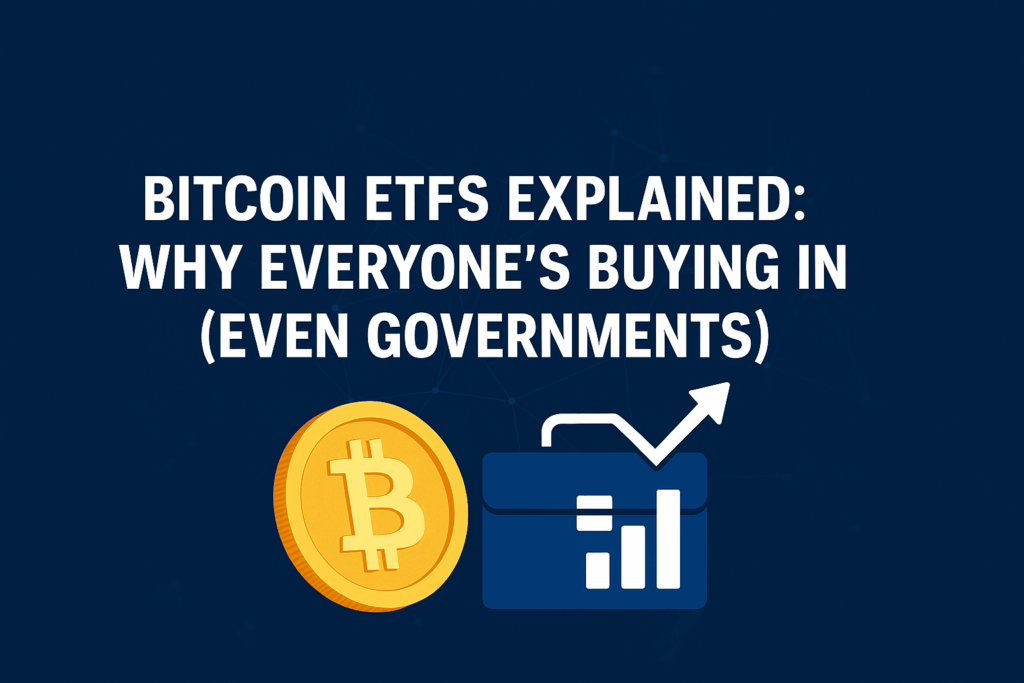In 2025, Bitcoin exchange-traded funds (ETFs) have become one of the most talked-about developments in the crypto space. Institutions, retail investors, and even governments are pouring capital into these financial instruments. But what exactly are Bitcoin ETFs, and why are they attracting so much attention now?
Let’s break it down.
What Is a Bitcoin ETF?
A Bitcoin ETF is a financial product that allows investors to gain exposure to Bitcoin without having to buy, store, or manage the cryptocurrency directly. Instead, investors purchase shares of the ETF through traditional brokerage accounts. Each share represents a portion of Bitcoin held by the fund.
These ETFs are listed on major stock exchanges, making them accessible to everyday investors who may be hesitant to use crypto wallets or navigate decentralized exchanges.
Why Bitcoin ETFs Are Booming in 2025
The popularity of Bitcoin ETFs has skyrocketed this year, largely due to regulatory clarity and growing institutional trust. With the approval of multiple spot Bitcoin ETFs in the U.S., Europe, and parts of Asia, capital has flowed in from pension funds, asset managers, and sovereign wealth funds.
Here’s what’s fueling the surge:
1. Institutional Confidence
Bitcoin ETFs signal maturity. When major players like BlackRock, Fidelity, and Vanguard back these products, it creates a domino effect. Other institutions feel more confident stepping in because of the perceived reduced risk. These funds also comply with strict financial reporting and custody standards, which satisfy internal risk committees and compliance teams.
2. Simplicity and Safety for Retail Investors
Buying Bitcoin on-chain requires technical know-how, managing private keys, and understanding wallets. ETFs eliminate that friction. Anyone with a brokerage account can now gain Bitcoin exposure through a few clicks, just like buying shares of Apple or Google.
This accessibility has opened the doors to millions of investors who were previously sitting on the sidelines.
3. Government Participation
One of the most surprising shifts in 2025 is the entrance of governments. Several nations are now adding Bitcoin ETFs to their sovereign wealth funds or national reserves as part of broader diversification strategies. Some view it as a hedge against inflation, others as a strategic asset for the digital age.
Countries like El Salvador and the UAE have publicly disclosed Bitcoin ETF holdings, while others are making quieter moves behind the scenes.
Read Also: Top 10 Altcoins Set to Explode Before December…
4. Market Impact and Liquidity
With more ETFs live and more capital pouring in, the Bitcoin market has become more liquid and less volatile. ETF inflows have provided a steady upward pressure on prices while smoothing out short-term dips. This creates a positive feedback loop: more stability attracts more capital, which makes even greater stability.
ETF volumes now account for a significant share of total Bitcoin trading activity, especially during U.S. and European trading hours.
5. Tax and Regulatory Benefits
For many investors, especially those in countries with complex crypto tax laws, ETFs offer a more straightforward path. Gains from ETF shares follow the same rules as traditional stocks, which makes them easier to report and manage. Institutional players also prefer ETFs because they align with existing custodial, accounting, and regulatory systems.
A Gateway to Broader Crypto Adoption
Bitcoin ETFs are not just about Bitcoin. They serve as a bridge between the traditional financial system and the decentralized crypto economy. As more people gain exposure through ETFs, they become more open to learning about Web3, digital assets, and blockchain innovation.
Some ETF providers are already exploring future offerings for Ethereum, Solana, and even diversified crypto baskets. The success of Bitcoin ETFs paves the way for broader crypto ETF portfolios that could redefine asset allocation models globally.
Conclusion
Bitcoin ETFs have shifted the landscape. What once seemed like a niche investment is now a mainstream financial product supported by governments, trusted by institutions, and embraced by retail investors. In the process, they’ve helped Bitcoin gain credibility, liquidity, and long-term staying power.
This is no longer a question of if crypto goes mainstream. With ETFs leading the charge, it has already.
Damilola Ojoye
Oluwadamilola Ojoye is a seasoned crypto writer who brings clarity and perspective to the fast-changing world of digital assets. She covers everything from DeFi and AI x Web3 to emerging altcoins, translating complex ideas into stories that inform and engage. Her work reflects a commitment to helping readers stay ahead in one of the most dynamic industries today







